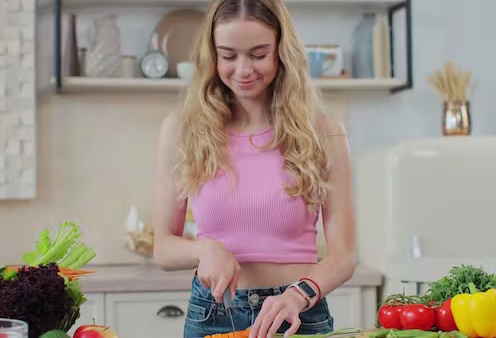Is TikTok right – will eating three carrots a day really give me a natural tan?
- Written by Lauren Ball, Professor of Community Health and Wellbeing, The University of Queensland

A beauty trend gaining popularity on TikTok, dubbed the “carrot tan”, claims eating three carrots a day will give you a natural tan.
But can this really give you a natural glow? And is it healthy?
Read more: Explainer: why are carrots orange?[1]
Why would carrots affect your skin tone?
Carotenoids[2] are natural pigments that give red, orange and yellow colours to fruits and vegetables. Think of them as nature’s paint.
There are many carotenoids including lutein, lycopene, alpha-carotene and beta-carotene. Beta-carotene is the carotenoid responsible for a carrot’s vibrant orange colour.
Once a beta-carotene containing food is digested, special cells in the gut break it into two molecules of retinol (also known as vitamin A). This vitamin A is then used in various critical bodily functions such as vision, reproduction, immunity and growth.
The body controls the conversion of beta-carotene into vitamin A based on what it needs. So, when the body has enough vitamin A, it slows down or stops converting beta-carotene into vitamin A.
Any extra beta-carotene is then either stored in the liver and fat tissue, excreted through poo, or removed via sweat glands in the outer layer of the skin. This is when the orange skin “tan” can happen. In medicine, this is called carotenoderma[3].
Carotenoderma gives your skin a yellow/orange pigment that is not the same colour you’d turn from a sun tan. It is concentrated[4] in the palms of the hands, the soles of the feet and smile lines near the nose.
Carrots are not the only food that contains beta-carotene. Dark-green leafy vegetables, some (not all) other yellow- and orange-coloured vegetables and fruits also contain high amounts. Beta-carotene is also found in parsley, basil, chives, chilli powder, sun-dried tomatoes and some dietary supplements.
How many carrots are we talking?
A few days of high carrot intake will unlikely result in a change in skin colour.
No high quality trials have been conducted to test the relationship between number of carrots eaten per day and skin colour changes or other outcomes. However, there is evidence that carotenoderma appears when blood levels get higher than 250-500 µg/dL[6].
One published case report[7] (where researchers talk about one patient’s case) found eating around 3 kilograms of carrots per week (about seven large carrots a day) induced skin colour changes.
Other experts suggest you would need to eat at least ten carrots per day[8], for at least a few weeks, for colour changes to occur. Most people would find this carrot intake challenging.
The amount of carrots needed to change skin colour will also depend on[9] the variety of carrot, its size and ripeness, the way the carrot is prepared (raw or cooked) and whether or not the carrot is eaten with a source of fat. A person’s weight and gastrointestinal health will also impact the amount of beta-carotene absorbed.
Is it dangerous to eat too much beta-carotene?
Vitamin A comes in two main forms, preformed vitamin A and provitamin A.
Preformed vitamin A is the active form of vitamin A found in animal-based foods including liver, fish liver oil, egg yolks and dairy products. When you eat these foods the preformed vitamin A is already ready to be used by the body.
Provitamin A compounds (including beta-carotene) are the precursors to vitamin A. Provitamin A compounds need to be converted into active vitamin A once inside the body.
Preformed vitamin A can be toxic if consumed in large amounts[10]. However, provitamin A compounds don’t cause vitamin A toxicity[11] in humans because the body tightly regulates the conversion of provitamin A compounds to vitamin A. For this reason, there are no recommended[12] limits on how much beta-carotene a person can safely consume each day.
There is, however, some[13] evidence[14] that taking high-dose beta-carotene supplements (20 mg per day or more) increases lung cancer risk in people who smoke cigarettes or used to smoke. This may be due to[15] changes to chemical signalling pathways.
The Cancer Council therefore recommends[16] avoiding high doses of beta-carotene supplements (more than 20 mg per day), especially if you smoke. This does not[17] relate to wholefoods though, so people who smoke should still consume fruits and vegetables that have beta-carotene.
Read more: Carrots and pumpkin might reduce your risk of cancer, but beware taking them in pill form[18]
Why you should aim for a variety of vegetables
You can still use food to look great without focusing on eating carrots. Incorporating various colourful vegetables, particularly those high in carotenoids, into your diet may promote[19] a natural radiance and a gentle enhancement in skin tone[20].
Rather than processed foods, a high variety of fresh vegetables provide various nutrients, and some may have what others lack. So it’s important to have a balanced diet that doesn’t depend on a single type of vegetable.
No matter how many carrots you eat in a day, it’s important to protect[21] your skin with sunscreen when going outside.
References
- ^ Explainer: why are carrots orange? (theconversation.com)
- ^ Carotenoids (www.ncbi.nlm.nih.gov)
- ^ carotenoderma (onlinelibrary.wiley.com)
- ^ concentrated (dermnetnz.org)
- ^ Shutterstock (www.ncbi.nlm.nih.gov)
- ^ 250-500 µg/dL (www.ncbi.nlm.nih.gov)
- ^ case report (onlinelibrary.wiley.com)
- ^ at least ten carrots per day (health.clevelandclinic.org)
- ^ depend on (www.sciencedirect.com)
- ^ large amounts (www.eatforhealth.gov.au)
- ^ don’t cause vitamin A toxicity (www.ncbi.nlm.nih.gov)
- ^ no recommended (www.eatforhealth.gov.au)
- ^ some (jamanetwork.com)
- ^ evidence (www.nejm.org)
- ^ may be due to (www.tandfonline.com)
- ^ recommends (www.cancercouncil.com.au)
- ^ does not (wiki.cancer.org.au)
- ^ Carrots and pumpkin might reduce your risk of cancer, but beware taking them in pill form (theconversation.com)
- ^ promote (www.mdpi.com)
- ^ skin tone (journals.plos.org)
- ^ protect (www.sciencedirect.com)

















